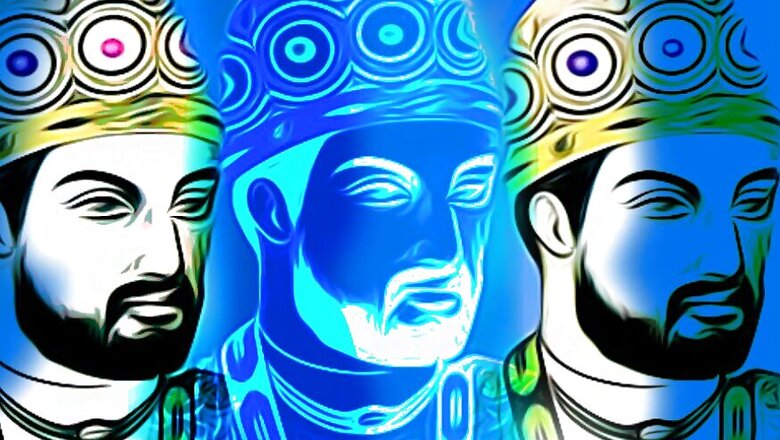
views
“I do what I think is in the best interest of the state; I do not care whether it conforms to the shariat or not”.
- Alauddin Khalji to Qazi Mughisuddin, who had announced to the Sultan that almost everything he did violated the shariat.
One grave problem with history is that while historians seek it out in all its complexities, popular perception reduces it to utter simplicities, as entirely one dimensional. If for the historian any age or a reign or a ruler would be marked by diverse and often conflicting facets and actions, for the TV channels and for the slogan shouting mobs, an age gets visualised as uniformly golden or dark, a ruler is forever either weak or strong, kind or cruel, liberal or dogmatic, anti-this or pro-that. One wishes history was as simple as that. Indeed, even as our own individual, family or institutional lives are more multidimensional than this gross simplicity! And things get far more complex at the apex.
The popular image of Alauddin Khalji being circulated currently is of a lustful man chasing beautiful women. Simple. Made simpler by his Muslim identity invested with the driving desire to conquer Hindu women. Enough; what else does one need know about him?
Plenty. He came to the throne of Delhi Sultanate in 1296 after killing the reigning Sultan, Jalaluddin Khalji, his uncle and father-in-law. Nothing unusual about capturing the throne by killing its current occupant anywhere and at any time in history. Even as prince he had shown passion for conquering far off territories and had led armies for it. Once on the throne, among his severest challenges was facing six major Mongol attacks, often at the head of vast armies of a lakh or more. The Mongols had run over the whole of Central Asia and reached up to Europe rolling up regimes indifferently whether these were Muslim or not, uniformly wreaking havoc everywhere. Less than forty years before Alauddin’s accession to the throne, they had ravaged Baghdad and put an end to the Islamic Caliphate located there. Alauddin repelled five of these massive invasions by waging war on them and on one occasion the Mongols withdrew on their own, even as they had reached Dehli. To pre-empt the recurrence of such a devastating eventuality which would starve the army and the people by denying them food and water, the Sultan constructed Hauz Khas to ensure supply of water. The same Hauz Khas which is now among New Delhl’s poshest areas. He was thus unique in the region to have secured India’s territorial integrity.
Medieval states everywhere financed themselves through collection of revenue from cultivators varying from a third to half the produce of their lands and labour. The mechanism of collecting land revenue in medieval India was through the village headmen and other potentates, Mukhias, Chaudhuris, Raos, Ranas, etc, known as zamindars. All of these groups were Hindus who helped Sultans establish their administration down to the village level. The zamindars were, however, quietly passing on their own revenue dues to the cultivators by collecting a bit extra on the sly from them. Alauddin put an end to it and subjected all to the same tax regime. This is what a historian, Ziauddin Barani, a contemporary of the Sultan, records as “impoverishing the Hindus”, the village potentates.
A major “reform” of his was setting up of a market in Dehli with very tight price control. Barani again records that the price of everything from a needle to a camel was fixed by the Sultan. To make sure that goods were neither under weighed nor over-priced, he would send out children to the market to buy things, had these weighed and if there was a shortfall, would chop off the same amount of flesh from the seller’s haunches! Such was the terror that the shopkeepers would add a bit extra to the purchase. The price control lasted almost till the end of his reign. How one wishes more rulers had brought prices under control with minus the chopping of flesh, of course!
Interestingly, while we know a great deal of Alauddin’s personality and life, chasing women was not one of his passions. Even more interesting is his attitude towards religion, Islam in his case.
Once again the popular image of him being cultivated through films and perhaps cartoons of being solely guided in all his actions by his fidelity to Islam is at variance with what history reveals to us. In fact, this singular image of all Muslim rulers solely driven by their religious zeal is bequeathed to us by the chief colonialist historian, James Mill, who saw no other motivation in the deeds of rulers in ancient or medieval India except their religious inspiration, whether Hindu or Muslim. It is, according to him, only with colonial regime that Indian were made aware of other facets of life. This was his mode of establishing the legitimacy of colonialism.
Indian historians have demonstrated the absurdity of this single-point approach to ancient and medieval India’s history. To return to Alauddin, sometime around 1310, when he had expanded the Sultanate’s territory to almost the whole of north-west, west and north India right up to Bengal, he expressed his desire to do something even more spectacular to be remembered for. He sought advice from his trusted counsellor Alaul Mulk, the “Fat Kotwal” of Delhi, whether he could also found a new religion just like Muhammad had done; for, in his view Muhammad had founded Islam with the help of his four trusted companions and had become immortal in history; he too after having created a vast empire and with not much left to do felt like launching a new religion, for he too was blessed with four very trusted companions. The “Fat Kotwal”, a wise man but too fat and therefore immobile to have become Wazir, advised him that doing so was in God’s, and not in man’s hands even if the man had four faithful companions and that the Sultan would use his time better by paying attention to his administration. Alauddin took his advice and refrained from going ahead with his religion project, but he did show, if inadvertently, such scant respect for either his Prophet or his religion that he seriously thought himself as the Prophet’s rival and of so casually creating a religion that would be rival to Islam!
To top it, once Alauddin called his theologian Qazi Mughisuddin to his presence and told him what he had been doing and each time asked him whether this was in accordance with the shariat and each time the brave Qazi said: “No Your Majesty, what you are doing is completely violative of the shariat’s injunctions.” Irritated, the Sultan declared he did what he thought was in the best interest of the state and was not bothered whether his acts conformed to or defied the shariat. But he let the Qazi return home in one piece! This too is recorded by the good old Barani.
So which is the single dimension of Alauddin we should judge him by?
(Author is a historian who taught Medieval History at Jawaharlal Nehru University)




















Comments
0 comment